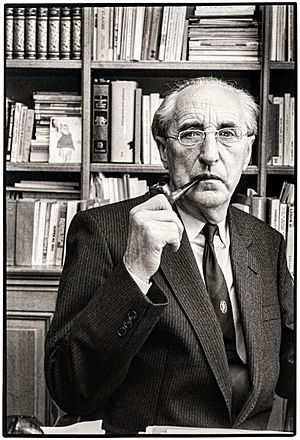Jan Verroken facts for kids
Quick facts for kids
Jan Verroken
|
|
|---|---|

Verroken in 1988
|
|
| Member of the Belgian Parliament for Oudenaarde | |
| In office 1950–1981 |
|
| Member of the European Parliament for the Dutch-speaking electoral college | |
| In office 17 July 1979 – 23 July 1984 |
|
| Personal details | |
| Born | 30 January 1917 Melden, Belgium |
| Died | 24 July 2020 (aged 103) Mechelen, Belgium |
| Political party | CDV |
Jan Verroken (born January 30, 1917 – died July 24, 2020) was an important Belgian politician. He lived to be over 100 years old! He helped shape Belgium's government for many years.
Contents
Jan Verroken's Life in Politics
Jan Verroken was born in a place called Melden, Belgium. He became a politician and held several important jobs. He was the burgomaster (which is like a mayor) of Oudenaarde. He also served in the Belgian Federal Parliament, which is Belgium's main law-making body.
Representing His Region
In the Belgian Parliament, Jan Verroken represented the area of Oudenaarde. He was also the leader of the Christian People's Party (Christelijke Volkspartij) in the Parliament. This shows he was a very influential person in his political party.
Working in Europe
Beyond Belgium, Jan Verroken was also a member of the European Parliament. This is a group of politicians from different European countries who work together on laws for all of Europe. He also served on the Benelux Parliament, which focuses on cooperation between Belgium, the Netherlands, and Luxembourg.
A Time of Change in Belgium
Belgium is a country with two main language groups: Dutch-speaking people (Flemish) and French-speaking people (Walloons). Sometimes, there were disagreements between these groups about language and culture.
One famous event was the "Split of the Catholic University of Leuven." This university had both Dutch and French-speaking students. During this time, some Flemish students used a slogan that Jan Verroken was connected to: "Walen buiten" (meaning "Walloons out"). This was part of a movement to separate the university into two different ones: the KU Leuven (Dutch-speaking) and the Université catholique de Louvain (French-speaking).
Years later, in an interview, Jan Verroken said that his role in these events was not as big as some thought. He also mentioned that Flemish people generally did not want to completely separate from Belgium, unlike some political movements in Wallonia during an earlier time called the "Royal Question."

